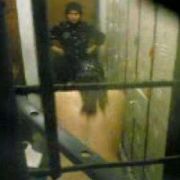 The 71-second video clip shot in a Multimedia Messaging (MMS) format was shown to several MPs as well as reporters by DAP’s Seputeh MP Teresa Kok at the Parliament lobby.
The 71-second video clip shot in a Multimedia Messaging (MMS) format was shown to several MPs as well as reporters by DAP’s Seputeh MP Teresa Kok at the Parliament lobby.Kok, at a separate press conference with Opposition Leader Lim Kit Siang said she believed the woman in the video clip was not one of the Chinese women nationals who had lodged reports recently against Petaling Jaya police for being falsely detained, stripped and abused. “Nevertheless, is it standard practice for police to ask detainees to strip naked and to do ear squats?” she asked.
"Squatting is a form of body-cavity strip search which women undergo before being confined at an immigration detention centre, police lock-up or prison cell," a source said. The repeated squats are supposed to "force" women detainees to discharge concealed objects. "Some may argue it is improper, but it applies to the daily operations at prisons."
 Stripping a woman detainee in a police lock-up and making her do ear squats in the nude may be "standard operating procedure" to the police, but is it legal?
Stripping a woman detainee in a police lock-up and making her do ear squats in the nude may be "standard operating procedure" to the police, but is it legal?"No," said human rights lawyers. "Where in the Lock-up Rules 1953 does it say that a body cavity search can be done?
"While the police claim that such searches are part of their standard operating procedures (SOPs), they must realise that their SOPs are not the law of the land. Any SOP has to be based on valid laws," said lawyer Amer Hamzah Arshad.
"Ear squats and body cavity searches are not written in the Lock-up Rules 1953, which govern the custody of the prisoner," said lawyer M. Puravalen.
Amer Hamzah added: "The mere fact that the police had conducted such searches previously as part of their SOPs does not make such searches legal, if in the first place there is no law to allow such searches."
He said that although the Police Act allowed the Inspector-General of Police to issue administrative orders which are known as "Standing Orders", they must not be contrary to the existing laws of the country.
Furthermore, he said Standing Orders had no force of law.
Amer Hamzah pointed out that the only law which allowed for a search to be conducted was in the Criminal Procedure Code, which in Section 20 says that "the police may search the body of such person and place in safe custody all articles other than the necessary apparel found on the person".
However, the law did not require detainees to be stripped naked before they could be placed in the lock-up.
Furthermore, Rule 7 of the Lock-up Rules 1953 states: "Every prisoner shall be searched on admission and all clothing and property, other than one set of clothing, shall be removed."
"The rule is silent as to whether a detainee can be subjected to a strip search or cavity search. In my view, the rule then must be read in conjunction with Section 20 of the CPC," he said.
"If the law is silent on the matter, this does not make strip searches legal. If there is any doubt in the law, the doubt is supposed to go in favour of the prisoner," Amer Hamzah said.
Both lawyers said that if strip or cavity searches were necessary, then clear and express provisions should be made, like in the Prison Regulations 2000, which spell out how searches are to be conducted in prisons.
In that regulation, the search has to be made "with due regard to decency and self-respect", and "no prisoner shall be stripped and searched in the presence of another prisoner".
However, these regulations are only applicable to prisons, not police lock-ups.
“If the orang asing (foreigners) think we are zalim (cruel), ask them to go back to their own country,” Deputy Internal Security Minister Datuk Noh Omar declared during a Press conference in the Parliament lobby.
Nearly 20 years ago across the Causeway, another female was also subject to abuse by "law enforcement" agents. Following is an extract from the abridged version of lawyer Tang Fong Har's experience while detained for 87 days without being charged at the infamous Singapore Whitley Road Detention Centre, first published in the August 1989 issue of Index on Censorship, a UK-based non-government organisation. Tang was one of 22 people held in 1987 for "communist conspiracy to overthrow the Singapore government." In April that year the author, a lawyer aged then 31, together with eight other former detainees issued a declaration of innocence. All were at once rearrested, except Tang Fong Har, who was out of the country:
I FELT really frightened, cold, angry and sleepy. It was the longest night in my life. After my 'medical' examination, I was led out of the room and down a passage. After some turns, I reached a door, which opened onto a flight of stairs leading to the basement.
As I walked, without my glasses, I heard noises everywhere. I was approached several times by different men, each of whom said in a haughty manner, "So you are Tang Fong Har'" and then walked off. The basement was pitch-black except for the glaring lights. I was led into a room.
It was very dark except for the two spotlights, and it was filled with cigarette smoke - there seemed to be about seven or eight people there. The air-conditioning was very strong, and the floor was bare concrete. I felt cold and fearful.
After what seemed an eternity of eerie of silence, a voice boomed - "So, Tang Fong Har, at last you are here.' Then there began a series of questions and outrageous allegations. I could not hear properly as I was disoriented and I was not allowed to wear my glasses.
The hurling of questions, allegations, and loud noises went on for some time. I was so stupefied that I kept quiet. When I felt that I could not keep quiet anymore, I told them I needed my glasses as they affected my hearing.
My glasses were then returned. I saw four people seated at the table, which I was standing fairly near. Two or three other people were standing nearby in sports jackets, shoes and socks. Barefoot and in prison garb, I felt humiliated and very cold. I was shivering and I tried very hard to stop my teeth from chattering but I could not, and the interrogators just watched me as I was in near-spasms trying to control the cold.
At one point during the interrogation I was threatened with indefinite detention and asked whether I intended to emulate Chia Thye Poh. They warned me that if I chose to remain quiet, they could wait for 20 years or more, just as they had waited for Chia Thye Poh.
I refused to believe it but somehow my heart went cold. I felt I could not stay in this place for another minute, let alone 20 years. I also felt immense admiration for Chia Thye Poh. The male interrogator throughout made snide remarks about lawyers and the legal profession and belittled my work in the Law Society.
In the midst of the accusations being hurled at me, I retorted "Now, look here..." or words to that effect. I never completed my sentence: one of the interrogators slapped me across my left cheek, not with a flick of his wrist but with the full force of his body.
I fell to the ground and my glasses landed on my chest. I was completely shocked by the assault and wished that I could faint as I felt that I could not take any more. I had never felt more humiliated in my life.
The female Chinese then made a show of helping me to stand and said something like "It's ok. Take it easy. Why don't you co-operate?" I can't remember whether the interrogator who slapped me remained in the room after this. However, I remembered his face and subsequently I came to know his name: S. K. Tan.
I was then questioned on my 'escape' from Singapore on May 21 and my whereabouts from then until my return on June 8. I also had to account for my movements since my return. They assured me that I had not been arrested because of my work in the Law Society or for helping Mr Corera, the Workers Party candidate for the Alexandria constituency in the 1984 general election.
However, I was not informed about the allegations and charges against me until the detention order was served on me. The circle of questions/statements/allegations went on for some hours. Every time I went to the lavatory, I vomited and I felt even colder when I returned. I had looked at myself in the toilet mirror and I was a ghastly sight.
This was the first time in public that I was bra-less and I stooped whenever I walked so as to hide my breasts. My posture was a semi-permanent curve soon after. I could not stop the trembling. I vomited countless times, and by the morning of the third day I had my period and I stained the prison pants.
I continued vomiting until the fourth day, by which time I felt quite famished. I had never felt more terrible in my life. Some 10 hours later, I was led out of the basement and into one of the rooms off the passage, and was given a chair.
 The 49-year-old, who has lived in the United Kingdom for the last 37 years, has paid a fine for not fulfilling his national service duty and will be performing at the Esplanade next month.
The 49-year-old, who has lived in the United Kingdom for the last 37 years, has paid a fine for not fulfilling his national service duty and will be performing at the Esplanade next month.